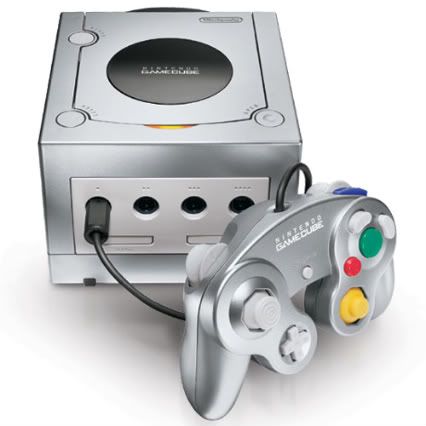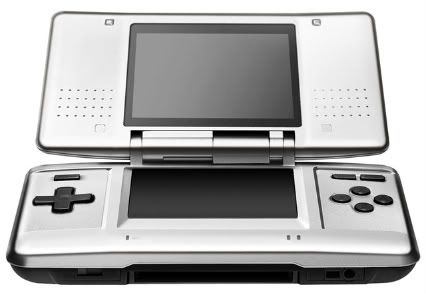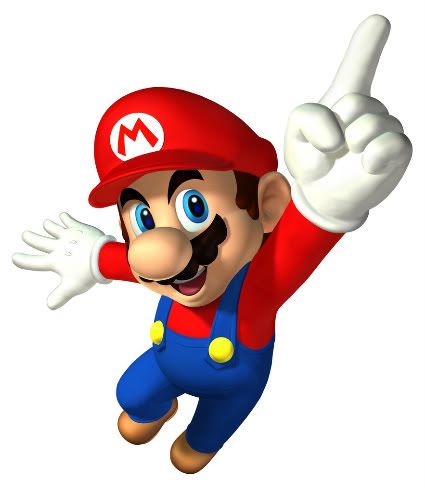
Nintendo's Mascot = Quality
Nintendo’s ‘seal of quality’ has traditionally been a badge, which reassured customers that software for their platform wouldn’t crash or damage their console. It was never meant to be a badge to guarantee the quality of the software. Yet, over the years, due to the large volume of quality titles that were released on Nintendo systems, it developed a following for meaning just that. The issue Nintendo currently faces is that aside from their first party titles and a minority of third party games, the majority of content being released for the Wii and DS is awful. This at a time when you can get plenty of awful software for free on the Iphone platform or quality high end content on other consoles. This software consumes the shelf space allocated for the Wii at retail and is skewing the public’s perception of what the Wii and DS stand for.
I am proposing that Nintendo take the ‘seal of quality’ and make it mean something again. They need to allow the seal to mean more to the consumer than a security badge saying ‘it’s safe to run’. Nintendo needs to offer confidence to the consumer in their marketplace. The challenge, of course, is how can Nintendo make its seal of quality mean something again, without shutting out small developers (no that large developers are always producing constantly great games)? It’s a pertinent question as the Wii is a console with an image and perception problem, which should not be allowed to carry through into its next, HD iteration.
The Wii software market is clearly being weakened by the glut of low quality third party games, which often reach out to the lowest common denominator in terms of gameplay experience, graphics and volume of content available to those who have purchased the game. Perhaps, though, before we work out how Nintendo can improve matters, we should first understand how the company ended up in this situation. History is not just there to sell books (or fill web pages), but can guide us to avoid the mistakes of yesterday recurring in the problems of tomorrow.

I have one, I love it, but not enough other people did.
Nintendo’s previous system, the GameCube, was starved of quality third party content from about a third of the way into its live span. Excluding EA bringing out its yearly sport franchises and the mainstream multi platform blockbuster (eventually even these were excluded from the GameCube) the console became a first party only platform along with the timed exclusive games from Capcom (most famously Resident Evil 4). No other console could have survived and still seemed relevant in this situation, but Nintendo’s own first party publishing and developing support is truly amazing.
Nintendo knew that for the Wii to be a success it had to break out of just being a ‘Mario and friends’ device, and luckily with the DS Nintendo had managed to build a lot of trust with developers who had previously abandoned working with the company. Hence with the launch of the Wii we saw a third party developer friendly approach to the console. As a technology platform it was already attractive due to the much lower development cost of building software for it in comparison to the Xbox 360 and PS3. Additionally as soon as it had become apparent (which it did very quickly) that this was going to be the main console for some time, the Wii was suddenly extremely attractive to develop for. The head of EA was apologising for having not seen the Wii ‘coming’ and promised to refocus internal studios on the platform.
There has been some great third party success stories such as the Wii version of Guitar Hero, UbiSoft’s Shaun White snowboarding game, Sega products in general and additional ‘mop up sales’ of Call of Duty related games. There have also been some third party games which have had good to amazing reviews but failed to sell copies such as Little Kingdom, No More Heroes, The Conduit, and similar products.
Following on from these though have been a bucketload (it’s a big bucket I have in mind) of shoddy, cheap to make (but not always cheap to buy) games which have wrecked the market. They have been games designed to ride the draft behind the march of great titles such as Wario Smooth Moves, Brain Training, Wii Fit and the Wii Sports concept. The fact they are often poorly made is not the biggest issue as their greatest crimes are that they have taken up shelf space, confused the consumer, and in some cases resulted in the consumer feeling ripped off and taken for a ride.
Nintendo, as with its history of the Gamecube, have found that they once again have to commit serious amounts of software development time and investment in bringing new and major first party titles to the Wii market. Consequently almost all of the games the Wii is looking forward to over the next 9-18 months are first party, and it is clear that it is these titles which will sustain the platform until the Wii2 is released.

A great machine, with some great software, let down by the fact it's home to tons of not so good software, which sells £10+
Regarding the DS platform it’s clear what Nintendo’s plan is; to abandon it and move onto the 3DS as soon as possible. This platform is designed to create as much ‘clear blue water’ between itself and the Apple market as possible. The increased graphical punch of the device along with the consumer expectation of a 3D experience will, they hope, result in ‘meatier’, hardcore related software titles for the platform. Nintendo itself is clearly focusing a lot of its own time on releases for the platform based on the huge list of third party games being developed for it. However, one wonders what will happen post release? The games being released on launch will be of a high enough quality that they can set the standard, and will hopefully force third party developers not to pitch their quality lower with the games that come in the second wave. However, one wonders if there is not more Nintendo could do to protect consumers.
One way would be to make the Nintendo seal mean something. The first thing to say is that the seal doesn’t have to be a barrier to a game being released. However not all games have to carry the seal, or perhaps we could have different versions of the seal. This would mean, in effect, that Nintendo was rating and reviewing their competitors’ games and result in a clear example of being in a situation where they could skew the market for their own sake. Perhaps this could be given over to an independent body funded out of the licence companies pay to publish their games on the Nintendo systems, and Nintendo themselves would have to submit their games ahead of release to the same body.
I can’t see the above happening. There is one simple way though of resolving this issue (well it’s easy from my perspective), and that is by Nintendo whole-heartedly adopting the Apple online market. All boxed games have to carry a Nintendo seal and Nintendo would perhaps control which games are released as a AAA experience in a much stricter fashion than they have with the Wii. However, to get the other titles on the system open up their download store so that it has thousands of games, and not just tens of games. Make the development kit for downloadable only titles cheap, and allow pricing to be in a real currency and not points. Heck even allow free titles, ad funded titles and more.
Apart from allowing Nintendo to offer the same core experience as the Itouch, and hence eat into Apple’s territory (taking the fight back to them), they can still offer that AAA experience via cartridges or a separate AAA download area should they wish to also offer downloadable versions of their boxed games.
The consumer, thanks to Apple, already understands that the app market has a huge variety of experiences on its platform, and they won’t need a Nintendo seal on the downloads. Additionally Nintendo does not need to worry about someone bringing out a full-featured game for £2 and undermining the main 3DS market. They can protect it by having memory constraints on the games released through their app store and perhaps limiting the application of some other technologies. However, the main protection will be the reality that for any company to justify the investment in a AAA title for the 3DS, as unlike the original DS top games will require large teams and long development times to get the best out of them, they will have to release it for at least £15 upwards.

Will Mario lead the third party market to the promised land of sustained quality?
I have no problems having rubbish or small games on the 3DS or the Wii2. However let’s keep them apart from the AAA products. XBL and PSN have so far managed to do this well, whilst the Apple Store has failed. Nintendo has been late to the online party, but can now sit back learn everyone’s lessons and use them to solve its own problem; how to save Nintendo’s Seal of Quality and make it mean something again.









I totaly agree with this. I’ve been into games for so long I can spot a stinker a mile away, but what about the joe blogs casual buyer? Too many times I see kids standing in line at Gamestation or whatever clasping some shovelware junk with their mum (who is paying for it) totaly oblivious to the dissapointnment they’re about to experience.
That said though, if parents can’t see a massive 18 cert logo, what’s the chances of them seeing a seal of quality?
Which is why nintendo need to force the crapware onto their much improved download store for the 3DS. everyone is used to the fact that app stores has a range of quality so it won’t disrupt the market too much, leaving quality games the physical shelf space they deserve.